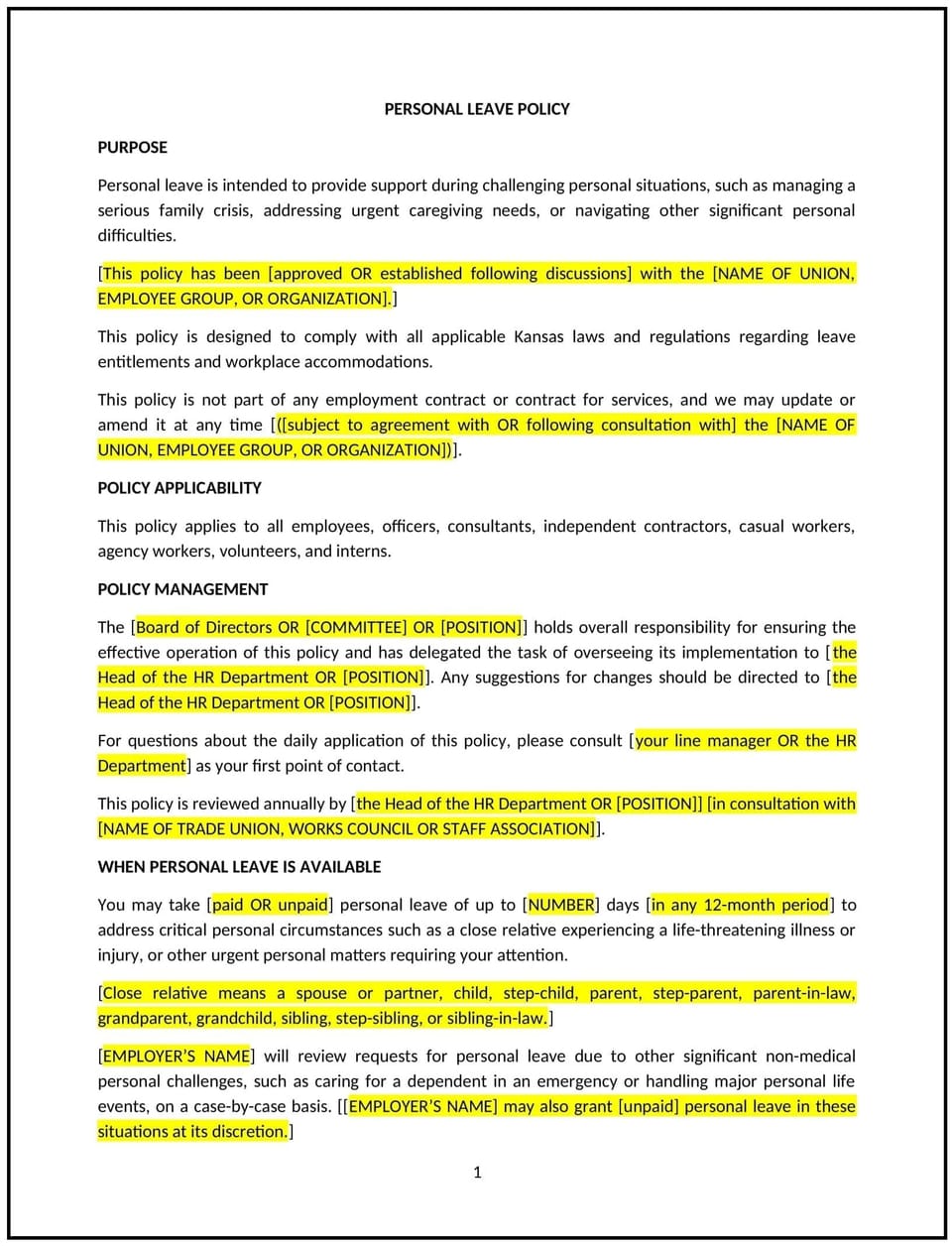Personal leave policy (Kansas): Free template

Personal leave policy (Kansas)
A personal leave policy helps Kansas businesses manage employee requests for time off for personal reasons not covered by other leave policies, such as vacation or sick leave. This policy outlines the process for requesting personal leave, the conditions under which it may be granted, and any applicable guidelines for maintaining productivity and fairness.
By implementing this policy, businesses can offer employees flexibility while maintaining clear guidelines for time-off requests and managing workload expectations.
How to use this personal leave policy (Kansas)
- Define eligibility criteria: Businesses should specify which employees are eligible for personal leave, including tenure requirements or any specific job roles that may have different entitlements.
- Establish a request process: Employees should be required to submit a formal request for personal leave, providing sufficient notice and any necessary documentation to support their request.
- Set leave duration: The policy should outline how much personal leave is available per employee, whether it is paid or unpaid, and the maximum duration for leave requests.
- Provide guidelines for approval: Businesses should establish clear approval processes, such as who is responsible for reviewing leave requests, and any circumstances under which personal leave may be denied.
- Address time-off scheduling: The policy should specify how personal leave requests will be managed to minimize disruption to the business, ensuring adequate staffing and operational efficiency.
- Maintain job protection: Employees should be guaranteed the right to return to their original position or an equivalent role upon their return from personal leave, with the same seniority, pay, and benefits.
- Review and update regularly: Businesses should periodically review the policy to ensure it remains relevant and aligns with any changes in business operations, employee needs, or legal requirements.
Benefits of using a personal leave policy (Kansas)
- Provides flexibility for employees: A clear personal leave policy allows employees to take time off for personal matters, such as family emergencies, without negatively impacting their job or reputation.
- Promotes fairness and transparency: The policy ensures that all employees are aware of the process for requesting leave and are treated equitably when it comes to approval and duration.
- Supports employee well-being: By offering personal leave, businesses demonstrate a commitment to employee health and work-life balance, improving job satisfaction and morale.
- Reduces absenteeism: By providing a structured way for employees to request leave, businesses can reduce the frequency of unscheduled absenteeism and manage staffing needs more effectively.
- Protects business operations: A well-managed personal leave policy ensures that employee absences are planned and can be covered, helping businesses maintain continuity of operations.
- Enhances retention: Employees are more likely to remain with a company that supports their need for personal time off, which can lead to higher retention rates and reduced turnover.
Tips for using this personal leave policy (Kansas)
- Communicate the policy clearly: Businesses should ensure all employees understand the personal leave policy, including how to request leave, any eligibility criteria, and the approval process.
- Offer flexibility in scheduling: Businesses should allow flexibility in when personal leave can be taken, ensuring that employees’ personal needs are met while maintaining business operations.
- Manage leave effectively: To minimize disruptions, businesses should encourage employees to request personal leave with as much advance notice as possible and to plan their time off in alignment with business needs.
- Be consistent in application: Businesses should apply the policy consistently to all eligible employees to prevent any perception of favoritism or discrimination.
- Keep accurate records: Businesses should maintain clear records of personal leave taken, including the duration of the leave and any supporting documentation, to track usage and manage staffing effectively.
- Regularly review the policy: Businesses should periodically review the policy to ensure it remains aligned with the company’s evolving needs and any changes in employment laws.
Q: Why should Kansas businesses implement a personal leave policy?
A: Businesses should implement a personal leave policy to provide employees with a structured process for taking time off for personal reasons, promote fairness, and maintain business operations.
Q: Who is eligible for personal leave?
A: Eligibility should be based on factors such as length of employment, job role, or other business-specific criteria. The policy should clearly define who qualifies for personal leave and under what conditions.
Q: How do employees request personal leave?
A: Employees should follow the process outlined in the policy, typically submitting a formal request to HR or management with adequate notice and any necessary documentation.
Q: Is personal leave paid or unpaid?
A: The policy should specify whether personal leave is paid or unpaid. Some businesses may offer paid personal leave as a benefit, while others may offer it as unpaid leave.
Q: Can personal leave be taken intermittently or in extended periods?
A: The policy should outline how personal leave can be taken. Businesses may allow intermittent leave for short absences or extended leave for longer personal matters, depending on operational needs.
Q: How can businesses manage personal leave to avoid operational disruptions?
A: Businesses should encourage employees to plan their personal leave in advance, provide adequate notice, and ensure that staffing is managed effectively to cover absences during key periods.
Q: How often should businesses review and update their personal leave policy?
A: Businesses should review their personal leave policy at least annually or whenever there are changes to legal requirements, company operations, or employee needs to ensure the policy remains relevant and effective.
This article contains general legal information and does not contain legal advice. Cobrief is not a law firm or a substitute for an attorney or law firm. The law is complex and changes often. For legal advice, please ask a lawyer.


